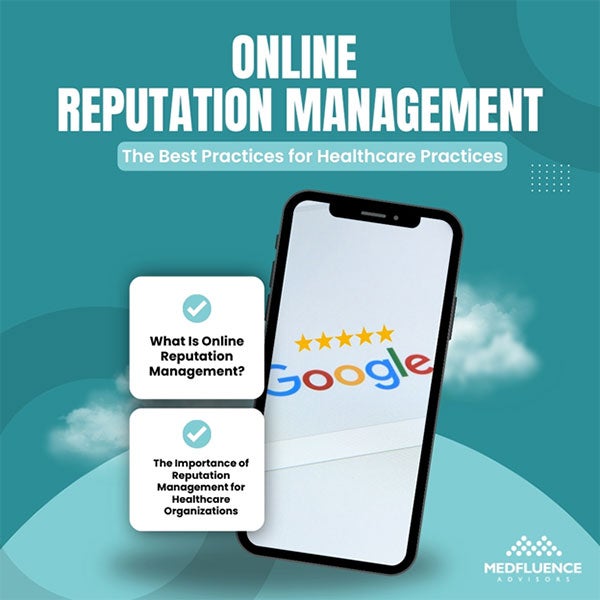Online Reputation Management: Best Practices for Healthcare Providers
In today’s digital-first world, your practice’s online presence has a direct impact on patient trust, appointment volume, and long-term success. With patients increasingly relying on Google, Yelp, Healthgrades, and other review platforms, your online reputation is no longer optional—it’s essential.
This guide explores key strategies to help healthcare organizations manage their online reputation effectively and ethically, ensuring you stand out in a competitive landscape.

✅ What Is Online Reputation Management in Healthcare?
Online reputation management (ORM) is the process of building, monitoring, and maintaining a positive digital image for your healthcare practice. This includes how your practice is portrayed in online reviews, directories, search engine results, and social media platforms.
In healthcare, ORM focuses on:
- Monitoring patient feedback and online reviews
- Addressing both praise and criticism
- Engaging patients through clear, empathetic communication
- Promoting trust and professionalism across all digital touchpoints
A strong online reputation builds credibility, attracts new patients, and reinforces trust with existing ones.
Why Healthcare Reputation Management Matters
Here’s why ORM is vital for today’s healthcare providers:
1. Make a Strong First Impression
Most prospective patients will Google your practice before scheduling an appointment. A robust online presence filled with positive reviews helps you make a trustworthy and compelling first impression.
2. Build Trust and Credibility
Healthcare is deeply personal. Patients need to trust that you’re competent, compassionate, and reliable. Reviews and ratings are often the first signal of that trust.
3. Influence Patient Decision-Making
Patient decisions are shaped by social proof. A consistent stream of positive reviews can sway new patients to choose your practice over another.
4. Encourage Practice Improvement
Online feedback offers valuable insights into patient experiences. Identifying patterns in complaints or praise helps you fine-tune operations, communication, and care quality.
5. Stay Competitive
You’re not just competing with other clinics—you’re competing with hospital systems and corporate healthcare brands. A curated, positive reputation helps you stand out in your local market.
Best Practices for Managing Your Online Reputation
1. Prioritize the Patient Experience
A great online reputation starts offline. Focus on creating a smooth, compassionate, and respectful experience throughout the entire patient journey.
- Simplify online forms, check-ins, and billing processes
- Maintain a clean, calm, and welcoming clinic environment
- Train staff to communicate clearly, professionally, and with empathy
- Use patient-friendly language to explain procedures and diagnoses
2. Ask for Feedback—Proactively and Politely
Happy patients are often willing to share their experiences, but they may need a nudge.
- Send follow-up emails or texts with direct links to review sites
- Thank patients for their reviews and explain how feedback helps improve care
- Make the process simple and accessible—minimize clicks or logins
3. Claim and Optimize Your Online Listings
Ensure your practice is listed on all major directories—Google Business Profile, Yelp, Healthgrades, Facebook, Vitals, and others. Then, keep these listings accurate and up to date.
- Maintain consistent NAP (Name, Address, Phone) details across platforms
- Add your business hours, services, insurance information, and provider bios
- Upload photos and videos of your practice where applicable
4. Respond to All Reviews—Positive and Negative
Every review deserves a response. Thanking patients builds goodwill; addressing concerns shows professionalism and accountability.
For positive reviews:
- Thank the patient genuinely and acknowledge their kind words.
For negative reviews:
- Stay professional and HIPAA-compliant
- Acknowledge the concern, express empathy, and offer to continue the conversation offline
- Avoid disclosing personal health information—even if the reviewer does
5. Showcase Testimonials Strategically
Social proof matters. Feature patient testimonials on your website and marketing materials (with appropriate permissions).
- Highlight reviews relevant to specific services (e.g., allergy care, sinus surgery)
- Use testimonials to speak directly to your ideal patients or niche specialties
6. Monitor Reviews Regularly
Stay alert to what’s being said about your practice. Check reviews weekly or use a reputation management tool to automate alerts.
- Monitor trends over time—not just one-off complaints
- Look for recurring themes (e.g., long wait times, unclear communication)
- Use this data to inform staff training and improve operational processes
7. Train Your Team on Reputation Awareness
Your team is a reflection of your brand. Every interaction—whether in person, by phone, or online—impacts reputation.
- Train staff in customer service, empathy, and conflict resolution
- Teach front-desk teams how to politely ask for reviews after positive interactions
- Share positive reviews with staff to reinforce morale and mission alignment
Internal Feedback Matters, Too
Encourage team feedback just as you do with patients. Create a safe channel for staff to share insights, flag issues, and suggest improvements. This not only builds trust internally but often leads to a better patient experience.
✅ A Strong Online Reputation Builds Real-World Success
Your online presence is more than a marketing tool—it’s a mirror of your practice’s credibility, values, and quality of care.
Patients are looking for providers they can trust. By implementing thoughtful, proactive online reputation management strategies, your practice can:
- Attract more patients
- Strengthen community trust
- Improve care through continuous feedback
- Stand out in a crowded healthcare landscape
Ready to Make a Positive First Impression?
Let your reputation speak for your excellence. Take control of your online presence—starting today.


